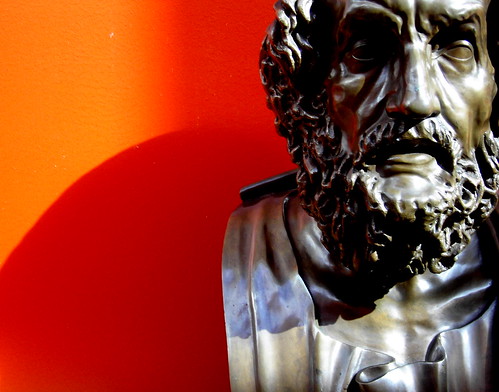 |
| Photo by Martin Gruner Larsen |
This month's Classics Circuit explores the literary productions of ancient Greece. I am thrilled to help kick off the week with a discussion of the history and context of these works.
As hard as it is to imagine a world without written language, that is exactly what Greeks experienced before texts such as the Iliad and the Odyssey came into being. Before the Mycenaean civilization fell (in roughly the 12th century BCE), residents of area used a script called Linear B in order to write an early form of Greek. This writing script was based on signs for syllables and on ideograms rather than on alphabetic notation. We have discovered no stories or personal narratives written down in Linear B. Instead, the language seems to have been used in more utilitarian ways--for record-keeping and the like.
When the Mycenaean culture was decimated, Greece was left with no written language for at least two or three hundred years. This period, sometimes called "the Greek Dark Ages," was a time without writing but not a time without stories. Bards traveled the land creating and refining stories of the exploits of gods and goddesses, myths and histories of war, and stories of men and women and their experiences of love.
As late as the eighth or ninth century BCE, an alphabetic writing system began to develop and spread in Greece. Two of the texts we can date back all the way to this date are the Iliad and the Odyssey. We know nothing about how these books were created and written down, nor do we know much about the authorship of these books. As the old joke goes, we think these works were written by Homer--but perhaps they were written by some other Greek chap who went by the same name.
Was Homer the poet who constructed a poem out of the storytelling tradition? Many scholars believe so, given the two poems' connections to the traditions of oral poetry (such as repetition and stock epithets). If the poems were composed by an oral storyteller, was he (or she, as some scholars suspect) also literate? Did he write the poem later, or did he recite it to a scribe, slowly and in pieces as the writer scratched the words laboriously onto animal skins? It is a process that is hard to imagine.

Although individual scholars put forth many theories about the composer(s) and writer(s) of these two poems, we are left with a great deal of uncertainty. As Manguel says, "It may be that Homer was born not as a man but as a symbol, the name that ancient bards gave their own art, turning a timeless activity into a legendary primordial person, into a celebrated common ancestor of all poets."
No comments:
Post a Comment